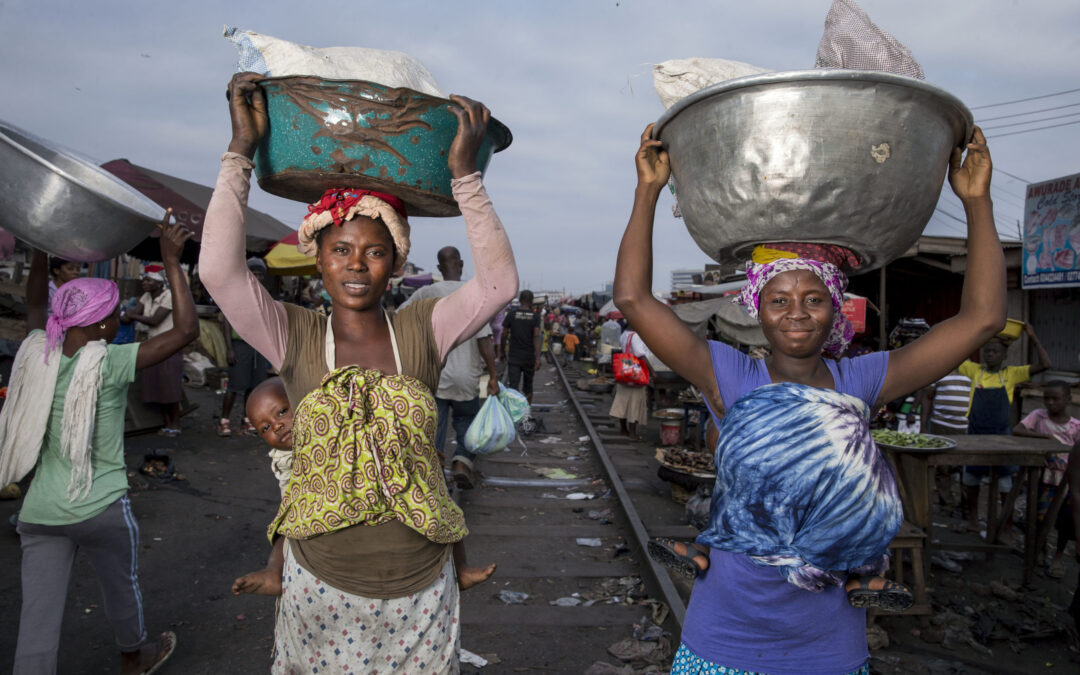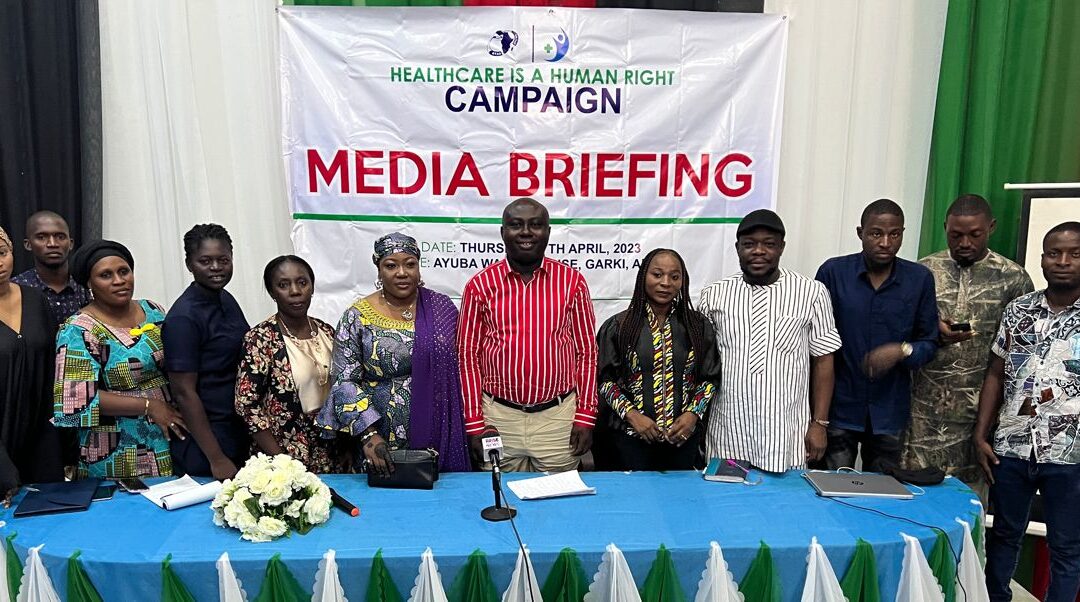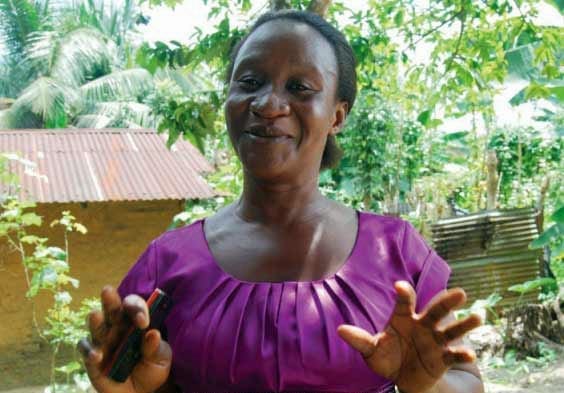
Dec 9, 2024
A four-year, regional, health care rights campaign led by the Organization of Trade Unions of West Africa (OTUWA) is expanding its success and influence in the region with Sierra Leone’s Finance Minister last month announcing a 2 percent increase in the country’s budget allocation for the health sector, from 7 percent in 2024 to 9 percent in 2025.
“The Sierra Leone Labor Congress appreciates the increase as a success of our health care campaign,” says OTUWA Executive Secretary John Odah, while noting that Sierra Leone’s government has not met the 15 percent minimum annual budgetary health allocation to which African heads of state agreed in the landmark 2001 Abuja Declaration.
Like many countries in the region, in the context of mounting national debt, multinational tax dodging and illicit financial flows, Sierra Leone’s government is struggling to provide essential services to its citizens, including accessible health care.
Sierra Leone’s health care funding increase builds on the success of OTUWA’s “Health Care Is a Human Right” campaign this year in Nigeria, where the federal government in April announced a disbursement of almost $70 million to bolster the country’s health infrastructure.
Given that more than 80 percent of West Africa’s working people earn their living in poorly paid and uncertain informal-sector jobs, lack of access to state-provided health care or health insurance is placing an unfair financial burden on low‐income individuals and households, say unions. A United Nations report noted that 381 million people, or almost 5 percent of the world’s population, were pushed into extreme poverty in 2019 by out-of-pocket health expenditures.
OTUWA’s health care rights campaign unites West Africa’s unions in a fight for equal and fair health care access for all. Campaign participants, which include OTUWA affiliates and national health care unions, have been advocating since 2020 for the protection of health worker rights and effective, accessible health care for all with national and continent-wide African Union legislators and policymakers, including the Economic Community of West African States (ECOWAS) Parliament. An OTUWA survey of 700 health workers living in Gambia, Ghana, Nigeria, Senegal, Sierra Leone and Togo provided a window into the region’s health-sector shortcomings and presented a raft of recommendations that included increased funding for the health care sector across the region. This year, the campaign expanded its influence through an alliance with Public Services International, a global union federation that represents 30 million workers in 154 countries and, to preserve public resources, added good governance to its demands.
“We celebrate with our Sierra Leonean brothers and sisters and will continue to support unions that are demanding more investment by governments in the health of their citizens,” says Solidarity Center Africa Regional Program Director Christopher Johnson.
OTUWA represents trade union national centers in the 15 West African countries comprising ECOWAS. None of West Africa’s signatory governments–required by ECOWAS Fundamental Principles to promote and protect human rights in accordance with the African Union (AU) Charter on Human and People’s Rights, including provision of social protections such as health care–are implementing the 15 percent minimum annual budgetary health allocation.

Jun 5, 2024
Through expanded regional and global partnerships, the Organization of Trade Unions of West Africa (OTUWA) is growing its campaign for increased budgetary allocation to health care in the region, said OTUWA Executive Secretary John Odah from Abuja, in a solidarity message to the opening session of the 24th Plenary of the West African Health Sector Unions Network (WAHSUN).
Now in its fourth year, OTUWA’s “Health Care Is a Human Right” advocacy campaign is allying with global union federation Public Services International (PSI), civil society organizations across the region and WAHSUN to better advocate for equal and fair health care access for all who live within the Economic Community of West African States (ECOWAS).
Nearly 83 percent of Africa’s workers are trapped in poorly paid and uncertain informal-sector jobs and lack access to state-provided health care or health insurance—an unfair financial burden on the continent’s most vulnerable individuals. And yet West Africa’s governments are not implementing the 15 percent minimum annual budgetary health allocation to which African heads of state agreed in the landmark 2001 Abuja Declaration. No country in the region achieves this percentage currently.
OTUWA’s campaign, launched in 2020 by national labor federations from five countries, has expanded its reach to health sector unions and national labor centers in eight countries—including the Gambia, Ghana, Ivory Coast, Liberia, Nigeria, Senegal, Sierra Leone and Togo—as well as to civil society organizations such as the International Federation of Women Lawyers (FIDA). The Office of the United Nations High Commissioner for Human Rights with the World Health Organization defines the right to health as “a fundamental part of our human rights and of our understanding of a life in dignity.” The Solidarity Center supports OTUWA in this campaign and on other worker rights initiatives.
“Together we must get public health services out of their chronic state of neglect and underfunding,” Odah told the Solidarity Center, adding that OTUWA’s campaign is adding good governance to its health care demands.
Thus far, the campaign has gathered and released important regional health care worker data and initiated advocacy meetings with national, regional and continent-wide African Union legislators and policymakers, including the Parliament of the Economic Community of West African States (ECOWAS). The campaign most recently saw success in Nigeria earlier this year, where the federal government announced a disbursement of almost $70 million to bolster the country’s health infrastructure.
“Only a transparent, democratic system can secure, fairly allocate and responsibly spend increased health care funds,” said Odah.
OTUWA represents national trade union centers in the 15 West African countries comprising ECOWAS. PSI encompasses more than 700 trade unions that represent 30 million workers in 154 countries.
Watch a video about the campaign.

Apr 19, 2024
A regional health care rights campaign led by the Organization of Trade Unions of West Africa (OTUWA) saw some success in Nigeria this month, where the federal government announced a disbursement of almost $70 million to bolster the country’s health infrastructure.
The funds will be delivered through the country’s Basic Health Care Provision Fund, which delivers essential but often out-of-reach health care service to Nigeria’s citizens—more than 90 percent of whom work uncertain, poorly paid informal jobs.
“We celebrate with our Nigerian partners and will continue to support unions that are demanding more investment by governments in the health of their citizens,” says Solidarity Center Africa Regional Program Director Christopher Johnson.
In Nigeria, where out-of-pocket health care payments were reportedly among the highest in the world in 2023, the campaign is supported by the International Federation of Women Lawyers (FIDA), the Medical and Health Workers Union of Nigeria (MHWUN), the National Association of Nigeria Nurses and Midwives (NANNM) and labor federations Nigeria Labor Congress (NLC) and Trade Union Congress of Nigeria (TUC).
In the region, OTUWA’s “Health Care Is a Human Right” campaign is supported by OTUWA’s affiliates together with many of their health-sector unions. A 2020 survey of 700 health workers living in Gambia, Ghana, Nigeria, Senegal, Sierra Leone and Togo provides a window into the region’s health-sector shortcomings and presents a raft of recommendations for ensuring the protection of health worker rights and effective, accessible health care for all.
OTUWA’s “Health Care Is a Human Right” campaign, launched in Abuja in March 2020, unites OTUWA affiliates in a fight for equal and fair health care access for all who live within the ECOWAS region. The campaign includes collection of health data and advocacy with national and continent-wide African Union legislators and policymakers.
The region’s signatory governments are required by ECOWAS Fundamental Principles to promote and protect human rights in accordance with the African Union (AU) Charter on Human and Peoples’ Rights—including provision of social protections such as health care.
Like many other African countries, Nigeria’s government is struggling to provide essential services to its citizens in the context of mounting national debt and illicit financial flows. Curbing multinational tax dodging, government corruption and other criminal activity is essential, say unions, because doing so could cut by almost half the $200 billion annual financing gap for achieving the UN Sustainable Development Goals, according to the UN Conference on Trade and Development (UNCTAD). The 2023 SDG report noted that 381 million people, or almost 5 percent of the world’s population, were pushed into extreme poverty in 2019 by out-of-pocket health expenditures.
OTUWA represents trade union national centers in the 15 West African countries comprising the Economic Community of West African States (ECOWAS).

Jul 5, 2014
In Nigeria’s oil-rich Niger Delta, where the nation’s vast oil revenue has not benefited working people, who typically are paid less than $2 per day, women and children are especially vulnerable.
Yet in the face of corruption, environmental degradation, gender discrimination and human rights abuses, a unique, women-led grassroots coalition is training and mobilizing women in urban and rural communities, empowering them to hold local lawmakers accountable and achieve concrete goals in their communities.
Women Initiative for Transparency and Social Justice (WITSOJ), a coalition of union and community groups, formed in 2007, inspired by a Solidarity Center workshop on women’s empowerment and civil-society participation in Warri, a major oil city in Delta State. Since then, WITSOJ has trained more than 5,000 women and young people in hands-on workshops.
“Because of the way the government has been running its affairs (local residents) think they should beg for health care services, schools, roads,” said Sarah Emmanuel-Apia, a lawyer and WITSOJ leader. “We show them the (Nigerian) constitution and the budget and (show them that) these things should come to them even without asking—and if they don’t get it they should come together to make their demands.”
Following one such WITSOJ training in 2011, hundreds of women from several communities marched to the local council building in Oyigbo, a town northeast of Port Harcourt, to demand a health care clinic. Local officials had ignored their requests for years, but empowered by WITSOJ, the women refused to be turned away. Ultimately, the government renovated the area’s dilapidated health clinic and also built a well-equipped health center at nearby Obuakpu.
“Maternal mortality is very high here,” said Emmanuel-Apia. “It’s normal here for women to die giving birth. If bringing the health center will help them live longer, we will support it.”
Emmanuel-Apia and others in WITSOJ are featured in a new Solidarity Center report, “Nigeria: Empowering Women, Transforming Society,” available in English and Spanish.
As a coalition of more than 20 local organizations, WITSOJ regularly taps into the expertise of its members, such as Women in PENGASSAN, the Petroleum and Natural Gas Senior Staff Association of Nigeria.
Ijeoma Dom-Nwachukwu, national chairwoman of Women in PENGASSAN, says the union partners with WITSOJ to fight for “the women who are marginalized in rural areas.
WITSOJ coordinator Dr. Jennifer Spiff says the union’s deep roots in local communities adds credibility to WITSOJ. “The partnership with the union “gives WITSOJ the leverage to be trusted as an organization owned by the masses,” she said.
“Working people see trade unions as representing the people, and believe that WITSOJ cannot be hijacked by politicians, since it has a union collaboration.” The coalition also includes the Nigeria Labor Congress (NLC) and the Trade Union Congress of Nigeria (TUC).
Through its outreach, “WITSOJ has made women realize the need for gender equality, and that most times, women can become as good ambassadors in leadership as their male counterparts,” said journalist Gold Minimah, an active WITSOJ member.
Victory Goodluck, a WITSOJ member and farmer from the Ihuike community in Ahoada East Local Government, points out that the organization’s strategy to focus on women works “because women are instruments of change.”
The report is part of Catalysts for Change, a Solidarity Center series highlighting the working people, their unions and activists who are advancing worker rights and greater equity in their societies.




